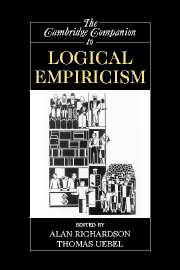Book contents
- Frontmatter
- Introduction
- Part I The Historical Context of Logical Empiricism
- Part II Logical Empiricism: Issues in General Philosophy of Science
- Part III Logical Empiricism and the Philosophy of the Special Sciences
- Part IV Logical Empiricism and its Critics
- 12 Wittgenstein, the Vienna Circle, and Physicalism: A Reassessment
- 13 Vienna, the City of Quine’s Dreams
- 14 “That Sort of Everyday Image of Logical Positivism”: Thomas Kuhn and the Decline of Logical Empiricist Philosophy of Science
- Bibliography
- Index
- Series List
14 - “That Sort of Everyday Image of Logical Positivism”: Thomas Kuhn and the Decline of Logical Empiricist Philosophy of Science
from Part IV - Logical Empiricism and its Critics
Published online by Cambridge University Press: 28 January 2008
- Frontmatter
- Introduction
- Part I The Historical Context of Logical Empiricism
- Part II Logical Empiricism: Issues in General Philosophy of Science
- Part III Logical Empiricism and the Philosophy of the Special Sciences
- Part IV Logical Empiricism and its Critics
- 12 Wittgenstein, the Vienna Circle, and Physicalism: A Reassessment
- 13 Vienna, the City of Quine’s Dreams
- 14 “That Sort of Everyday Image of Logical Positivism”: Thomas Kuhn and the Decline of Logical Empiricist Philosophy of Science
- Bibliography
- Index
- Series List
Summary
In the twenty-first century, no one is a logical empiricist. There are, to be sure, more than a few philosophers whose work resembles in important ways the work of the logical empiricists, indeed, whose work, if it had been done in the 1950s, would be logical empiricist work. But, no one presents such work under the rubric “logical empiricism.” Nor, really, could anyone plausibly attempt to do so - being a logical empiricist really is not a live option for a twenty-first century philosopher.
It is a matter of some historical and philosophical interest to think about why and how logical empiricism came to lose its status as a philosophical project to be pursued. After all, as this volume amply demonstrates, logical empiricism was a leading project in analytic philosophy in the not too distant past and, indeed, the preeminent project within certain branches of philosophy, such as philosophy of science. Something substantial must have happened for such a project to decline so importantly in influence that even the most technical work in areas such as confirmation theory or philosophy of physics cannot today be said to be examples of logical empiricist philosophy of science.
- Type
- Chapter
- Information
- The Cambridge Companion to Logical Empiricism , pp. 346 - 370Publisher: Cambridge University PressPrint publication year: 2007
- 18
- Cited by

